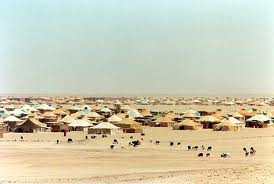Sahrawi Refugees: Temporary Solutions for a Long-standing Issue

Morocco has occupied much of Western Sahara since 1975, causing severe implications for the people of the country, including the restrictions on the use of the country’s natural resources in contravention of international law. The continuing occupation has prolonged a refugee crisis in Algeria.
On 3 September, the Robert F. Kennedy Center for Justice and Human Rights (RFK Center) issued a report on the human rights conditions in occupied Western Sahara. That report, while focusing primarily on issues of freedom of expression, bears witness to the enduring grave violations of a range of human rights for people under occupation and foreign domination.
Like other occupied lands (see report on the Dead Sea in Palestine), Morocco’s illegal occupation has led to the exploitation of Western Sahara’s natural resources, and as Morocco and other foreign parties benefit from this plunder over 165,000 Sahrawi refugees remain with no solution to their predicament. During the initial Moroccan takeover in 1975, thousands of Sahrawis fled to neighboring Algeria, mostly settling around the town of Tindouf. Today, the Sahrawi refugees still remain in camps, constituting one of the most-protracted refugee situations in the world.
The Sahrawi refugees in Algeria are largely dependent on aid for food, water, livelihoods and health services. International aid agencies and the Polisario Front (the Sahrawi independence movement and de facto Sahrawi government) have created a system of aid and assistance throughout the refugee camps; however, this vulnerable population has existed in isolation for almost 40 years and still lacks a just and viablesolution.
The RFK Center observed the living conditions of refugees in Tindouf, noting that the housing “cannot be accepted as part of any permanent standard of living.” Most persons live in tents or makeshift homes without access to running water, consistent electricity and exposure to an extremely harsh climate. After nearly four decades of these conditions, it is imperative that these living conditions are not considered acceptable. For the United Nations High Commission for Refugees (UNHCR), the ideal solution for any refugee situation is to facilitate return to the refugees’ country of origin; however, Morocco’s continued economic exploits for domestic use and foreign trade, as well as the maintenance of a 2,400 km wall flanked with landmines, imply that Morocco will not be withdrawing to permit Sahrawi self-determinationanytime soon.
This is not a new story. Meanwhile, despite the human rights violations of the occupation of Western Sahara, most of the world has remained inert on the matter. The RFK Center does not take sides regarding the solution in Western Sahara; however, it notes in the fact-finding report that “the failure of the parties to enact a permanent solution to the future of Western Sahara does not limit the international responsibility of the current administrations, to abide by international norms regarding respect for the human rights of people under their jurisdiction.”
As with any case of occupation, no real solution can be found for the Sahrawi refugees and other Western Saharans until the occupying power leaves the territory and restores the land and natural resources to its rightful owners.
|